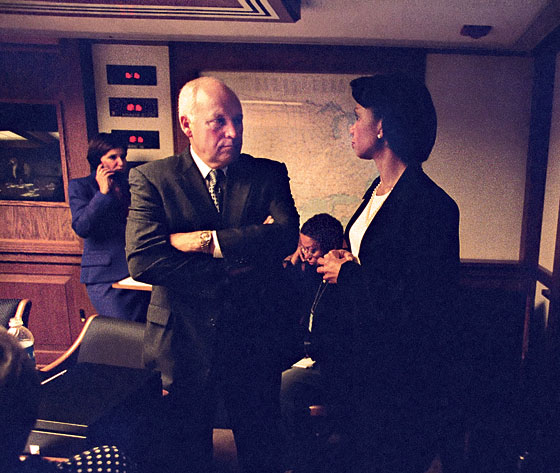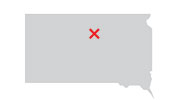 |
Dick Cheney
and Condoleezza Rice
in the Presidential
Emergency Operation
Center at the
White House on
September 11.
(Photo: Polaris) |
Dick Cheney is the most important government figure of the post-9/11 world. He has been called a shadow president and a war criminal. Virtually nobody had access to Bush without first going through him. But like an éminence grise out of some Graham Greene novel, he is almost impossible to apprehend [C2], even when he is writing about himself. He reminds one of Talleyrand in that he is a master tactician and served several regimes. He seldom spoke as vice-president, and when he did, it was to his wife and confrere, Lynne; or his equally veiled right-hand man, Scooter Libby (who went to prison rather than implicate his boss in the Valerie Plame business); or David Addington, consigliere. He is both an ideologue and a pragmatist, a rare and brutal combination not often found in American politics.
The core of Cheney’s behavior might well be a jagged sense of helplessness and shock at the horror unfolding before him on that day. Staring at the TV in his office, taking in the carnage, he picked up the phone, trying to reach Bush in Florida. A Secret Service detail, alerted that a plane was heading for the White House, ran in, grabbed him by the shoulders, and raced him toward a bunker from which he watched the world change. Brent Scowcroft, an old friend, claimed to no longer recognize him after the terrorist attacks. In June 2007, when Bush underwent a colonoscopy, Cheney served for two hours and five minutes as acting president, and there’s something of a John Ford movie about the letter he wrote to his grandchildren that afternoon: As you grow, you will come to understand the sacrifices that each generation makes to preserve freedom and democracy for future generations, and you will assume the important responsibilities of citizens in our society. I ask of you as my grandchildren what I asked of my daughters, that you always strive in your lives to do what is right. For Cheney, this meant unceasing efforts to reassert the powers of the presidency over all other branches of government (a desire that President Obama may secretly share as of this moment).
Cheney is now very ill with a very bad heart, which, after at least five heart attacks, has finally pretty much given out. He is being kept alive by a pump that makes his blood flow. The man who championed waterboarding (and gay marriage) no longer has a pulse.
From the archives
• The Cheney Government in Exile (New York Magazine, March 15, 2010)
• Should Cheney Go? (New York Magazine, February 27, 2006)
• The Man Behind The Curtain (New York Magazine, November 7, 2005)
Jon Robin Baitz is the writer of the play Other Desert Cities, which will open on Broadway this fall. He is currently developing a play about the Bush White House’s relationship to the Justice Department.



